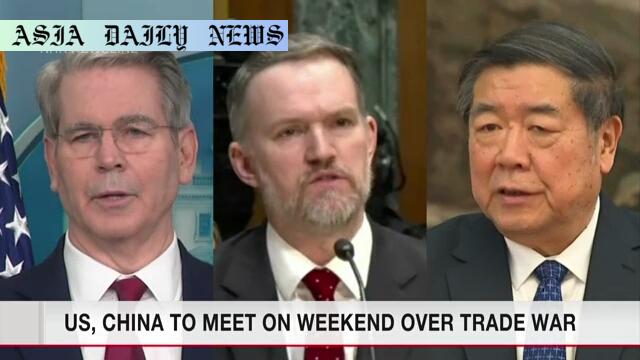Tariff Talks: Trade representatives from China and the US are set to negotiate this weekend in Switzerland, aiming for resolution.

Introduction to the Tariff Conflict
The ongoing tariff conflict between China and the United States has been a significant issue in global trade relations for years. Initiating with the US imposing tariffs on Chinese imports, the trade spat has escalated into a full-fledged economic standoff, with both countries increasing additional duties of over 100% against each other’s goods. This weekend sees a crucial turn in the narrative, as high-level negotiators from both sides are set to meet in Switzerland to discuss potential resolutions.
Upcoming Trade Talks in Switzerland
This weekend’s negotiations mark a critical phase in the trade saga. The US delegation led by Treasury Secretary Scott Bessent and Trade Representative Jamieson Greer will meet with Vice Premier He Lifeng of China. The two-day discussions, scheduled for Saturday and Sunday, were initiated at the request of Washington, reflecting the US’s increasing intention to recalibrate the strained trade dynamics. While both sides are stepping into the room with hopes of compromise, the shadow of skepticism looms large.
Unchanging Chinese Stance and Preconditions
China’s foreign ministry has reiterated its firm opposition to the US’s so-called abuse of tariffs. Lin Jian, a spokesperson for the ministry, emphasized that the US must approach the negotiation table with principles of equality, mutual respect, and mutual benefit. As disputes over trade imbalances, intellectual property, and manufacturing dominance persist, such principles will be fundamental in bridging significant divides.
The Long Road to Resolution
Even though the negotiations in Switzerland represent a step forward, the real challenge lies in aligning the core interests of both nations. The US argues that China’s trade policies unfairly impact American businesses. Conversely, China sees the tariffs as unwarranted economic aggression. To achieve tangible progress, both countries must make concessions and address foundational issues, such as adjusting tariff structures and improving bilateral trade transparency.
Implications for Global Trade
The implications of these talks extend beyond the two economies. The US-China trade war has rippled across global supply chains, affecting multinationals and smaller economies dependent on trade. A resolution could stabilize markets, encourage investments, and foster international economic confidence. Economists and political analysts alike will be closely monitoring these discussions, stressing their potential to reshape global trade dynamics significantly.
Conclusion: A Pivotal Moment
In conclusion, the upcoming trade talks between China and the US in Switzerland stand as a pivotal moment in resolving one of the most contentious economic disputes of our time. While the path forward remains uncertain, the dire need for constructive dialogue and mutual compromise could pave the way for a more sustainable trade relationship benefiting not only the two superpowers but the interconnected global economy.
Commentary
The Complexity of US-China Trade Relations
The US-China trade war is a reminder of how seemingly economic decisions can have far-reaching consequences. At its core, this conflict is far more than an economic issue; it’s political, strategic, and deeply rooted in the desire for global influence. As the two largest economies engage in this tug-of-war, their actions affect not just tariffs and trade but also the lives of countless individuals and businesses caught in the crossfire.
The Stakes of the Weekend Talks
This weekend’s negotiations in Switzerland represent an opportunity for both nations to recalibrate relations. However, the key is sincerity and compromise. While tensions remain high, there is undeniably a mutual interest in stabilizing relations amid growing global economic pressures. Failure to reach a consensus risks further escalation, threatening global supply chains and worsening the economic outlook for years to come.
Pathways to Resolution
For a resolution to be effective, both the US and China need to adjust their strategies. The US must move beyond tariff-based coercion, addressing core concerns like intellectual property theft through collaborative mechanisms. Meanwhile, China has to ensure greater transparency in its trade practices and show a willingness to accommodate international norms. A middle ground could be achieved if both parties genuinely prioritize global stability over narrow, short-term gains.
Global Significance of the Talks
The implications of this trade conflict emphasize an interconnected global economy. It is not just about China and the US; emerging economies heavily reliant on trade are affected, as are multinational corporations. With the world watching closely, the stakes go beyond bilateral relations, highlighting the importance of dialogue and professional diplomacy in resolving disputes of this magnitude.
Final Thoughts
The upcoming negotiations mark a defining moment in international trade relations. Both nations have much to gain from collaboration and much to lose if disputes persist. Whether these talks will succeed in bridging divides or further entrenching differences will define not only the future of US-China relations but also the trajectory of global economic policies. Here’s to hoping for constructive engagement and forward-looking compromises that benefit the world at large.


